The Zetas predicted that air travel would become increasingly risky. On July 23 a plane crashed in Taiwan, during rough weather but other planes were landing without problem. On July 24 a plane flying over Mali went missing, had diverted its path due to rough weather, and was found crashed the next day. On July 25 a plane flying to Barcelona, Spain was struck by lightning so severely that a forced landing occurred. Is this the new normal? Air Algerie Flight AH5017 Crashes in Niger Due to Bad Weather
Yet another airplane crashes due to electro-magnetic pulse. This time the crash was in the heart of Europe in the foothills of the Alps. The Zetas explain that stretch zones are susceptible to attracting the charged tail of Planet X, and the Eurasian Plate is under a stretch.
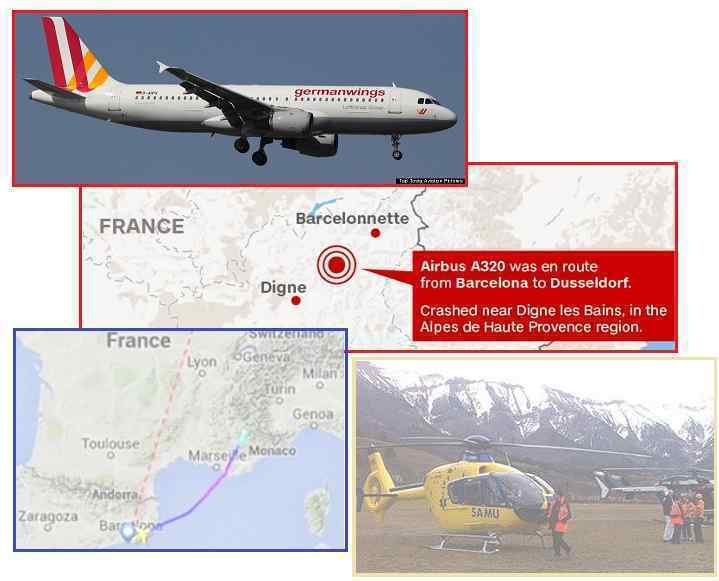
- Germanwings Crash: Plane Obliterated, 150 Presumed Dead
March 24, 2015
http://www.cnn.com/2015/03/24/europe/france-plane-crash/index.html
- March 24, 2015. A Germanwings Airbus A320 plane carrying at least 148 people crashed Tuesday in the foothills of the Alps in southeastern France. The plane crashed near Digne-les-Bains, in the Alpes de Haute Provence region.
- Germanwings Plane Crashes In South France, 150 Feared Dead
March 24, 2015
http://www.huffingtonpost.com/2015/03/24/germanwings-plane-crash
- The cause of the crash was not immediately clear. There did not appear to be turbulence or low cloud ceiling in the area.
ZetaTalk Summary 3/28/2015: We have repeatedly stressed that certain parts of the globe are susceptible to interaction with the charged tail of Planet X. This is certainly the case on the Sunda Plate, which is under continuous pressure to slip under the curve of the Indo-Australian Plate, as the MH 370 disaster shows. Stretch zones are most susceptible to the electromagnetic screech in the rock and the interplay with the charged tail of Planet X that causes interference with airplane electronics. This can be seen by AF 447 in 2009 while over the spreading Atlantic Rift. All of the Eurasian Plate, from the UK through to China, is under such a stretch. This can be seen in the hum in the UK and disappearing radar over the Danube River course and methane flashes in the Urals and the Sleepy Hollow phenomena.
What was the cause of the Germanwings crash? What is known is that the plane reached cruising speed and then began a descent. Meanwhile there was no communication from the cockpit, though communication lines had been open just a minute before the descent. If there was total electronic failure, as happened for AF 447 in 2009 and MH 370 in 2014, with no oxygen pumped into the cockpit or passenger cabin, the pilot can become unconscious.
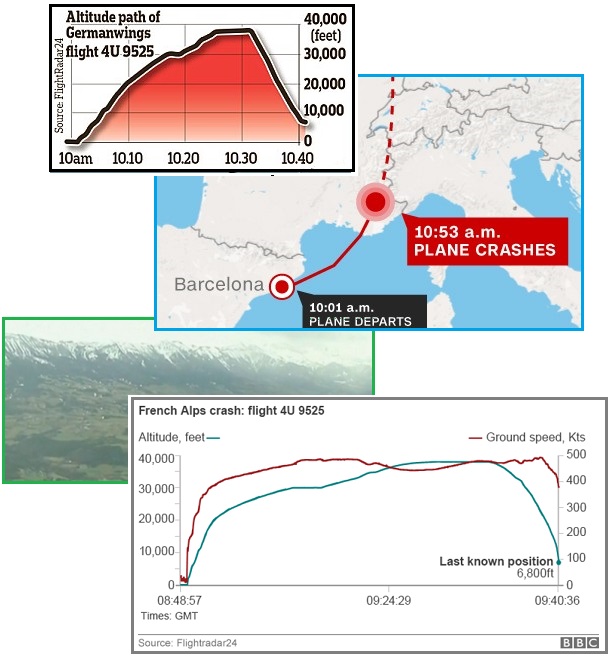
- Airbus A320 Plane Crash in Southern France
March 24, 2015
http://rt.com/news/243533-plane-crash-german-wings/
- Germanwings say they are not aware of any complications during the descent of the aircraft. It started descending one minute after reaching its cruising height and continued to lose altitude for eight minutes, before finally crashing. Air traffic controllers said they were in contact with the pilots of the Germanwings A320 aircraft just a minute before the plane started to descend.
- Britons on Board Doomed Germanwings Flight 4U 9525
March 25, 2015
http://www.dailymail.co.uk/news/article-3009151/headlines-news-Germ...
- Air traffic controllers claimed they received no SOS despite the jet nosediving 32,000 ft in just eight minutes. It is understood to have crashed at more than 400mph.
Without oxygen, the pilots and crew as well as the passengers will quickly become sleepy, confused, nauseous, and unconscious. If brain death occurs within four minutes, the stage where one is confused and unconscious occurs very quickly, in less than a minute. Electromagnetic pulse also affects electronics selectively, some incapacitated, some only damaged, but other managing to function. Electromagnetic pulse also makes one sleepy, as the Sleepy Hollow phenomena shows.
- Cerebral Hypoxia
http://en.wikipedia.org/wiki/Cerebral_hypoxia
- Continued oxygen deprivation results in fainting, long-term loss of consciousness, coma, seizures, cessation of brain stem reflexes, and brain death.
- Asphyxia
http://encyclopedia2.thefreedictionary.com/Oxygen+deprivation
- Symptoms of asphyxia vary but may include light-headedness, nausea, and gasping, followed by unconsciousness and death. An area quickly affected is the cerebral cortex, the brain center for speech and other conscious behavior; it can be irreparably damaged by as little as five minutes of oxygen deprivation.
- Electromagnetic Pulse
http://midimagic.sgc-hosting.com/emp.htm
- The electromagnetic pulse induces large currents in conductors that are part of or are connected to the equipment. These high currents can do the following: Induce voltages high enough to arc from one conductor to another, damaging whatever is connected to them. Induce voltages high enough to arc from a conductor to a device, damaging the device. Exceed the current-carrying capabilities of conductors or components in the device, damaging them. Induce voltages that exceed the voltage limitations of components in the device, damaging them. Induce voltages that exceed the breakdown voltage of insulation in the device, damaging other components. Cause voltage spikes that move atoms around in the doping of semiconductors, ruining them. Cause voltage spikes that puncture through the metallic oxide gates in semiconductors, ruining them. Cause all of the sparkplugs in an internal combustion engine to fire at the same time, stopping the engine. Damage the semiconductors in an electronic ignition system, stopping the engine and keeping it from running again. Blow fuses in electric power transmission lines, putting them out of service until the fuses are replaced.
One of the flight data recorders, the voice recorder from the cockpit, was retrieved and revealed that up until the descent all was normal and calm. Then when they reached cruising altitude the pilot left the cockpit and went to the bathroom but could not get back in. In the limited audio released to the media, the pilot can be heard pounding on the door. However, A320 doors are electronically controlled, locking and unlocking electronically. Loss of electronic control would have locked the door and disabled the pad. Or there would have been frantic keypad buzzing, clicking of the toggle switch in the cockpit to re-lock the door, and intercom phone calls. None of this was mentioned by the media. Why not?
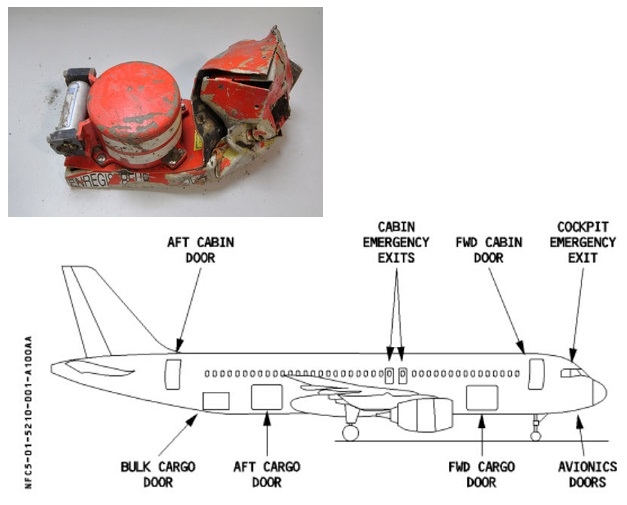
- A320 Doors
http://www.smartcockpit.com/aircraft-ressources/A320-Doors.html
- Cockpit Door: A forward-opening door separates the cockpit from the passenger compartment. In an emergency it can be forced open in either direction. The door has an electric locking latch controlled by the door unlock pushbutton on the pedestal. To unlock the door, the pilot must press the pushbutton, and maintain it pressed.
- Germanwings Pilot Was Locked Out of Cockpit Before Crash in France
March 26, 2015
http://www.nytimes.com/2015/03/26/world/europe/germanwings-airbus-c...
- The audio indicated that one of the pilots left the cockpit and could not re-enter. “The guy outside is knocking lightly on the door, and there is no answer,” the investigator said. “And then he hits the door stronger, and no answer. There is never an answer.” He said, “You can hear he is trying to smash the door down.” Among the theories that have been put forward by air safety analysts not involved in the investigation is the possibility that a pilot could have been incapacitated by a sudden event such as a fire or a drop in cabin pressure.
- Germanwing Crash Not the Full Story
March 29, 2015
http://www.sott.net/article/294482-Germanwings-crash-Not-the-full-s...
- Arnoux also wonders why no mention was made by investigators of hearing the loud strident beeping made by the cockpit door console when the emergency access code is entered to open the cockpit door. Arnoux recognizes that the emergency unlock code could have been overridden by someone in the cockpit manually holding the lock button down, but this would not have prevented the beeping once the code was entered outside. This would have been the clearest confirmation that one of the pilots had been locked out. Yet no mention was made of it.
The press is claiming the sounds of the co-pilot breathing steadily can be heard, thus his intention to commit suicide. This is more symptomatic of an unconscious co-pilot, as someone deliberately flying into a mountainside would be emotional and breathing rapidly. An unconscious co-pilot could also have fallen sideways onto the joystick, pushing it forward to cause the descent. The media only mentions turning a dial to control descent, which is an adjustment to the autopilot, not the joystick option. Manipulating the joystick overrides the autopilot. Why not? Because for airline profits to be maintained, the co-pilot is being blamed.
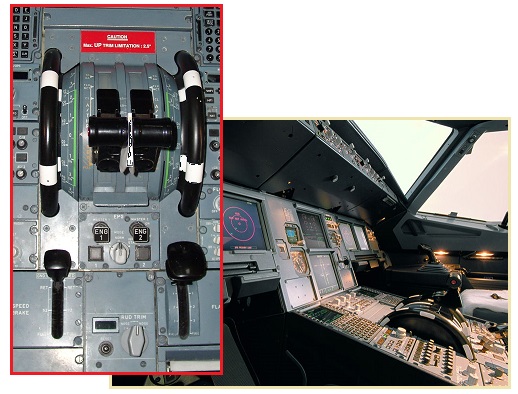
- The A320 is the First Launched Engineering Essay
http://www.ukessays.com/essays/engineering/the-a320-is-the-first-la...
- The A320 families typically used digital fly-by-wire control systems and control the aircraft by joystick at side-stick usually on right hand side, in commercial aircraft.
- Avcanada Forum
March 25, 2015
http://www.avcanada.ca/forums2/viewtopic.php?f=118&t=102237&...
- I have a question specifically for Airbus drivers. In normal cruise configuration, should a pilot end up leaning on the sidestick, pushing it forward, what will the aircraft do? Thinking about a possible incapacitation scenario, ie slumped forward due to a heart attack or anurism or some such event. What would the aircraft do with normal cruise set on auto, but a sidestick pushed forward?
ZetaTalk Analysis 3/28/2015: Has the public been allowed to hear the cockpit voice recorder? This will not be allowed, or only after it has been altered to fit the circumstances. What is missing at present is the door access buzzer. Normal exit and entry are via an intercom identification after a single keypad button is pushed. In an emergency a code can be typed into the keypad. It is true that the cockpit can block entry by pressing the lock button continuously. But during all or any of this, a buzzer is loudly sounding. If scraping chairs and a shutting door and steady breathing can be heard, where is the buzzer? The press has made much of the co-pilot breathing “steadily”, proof that he is alive and the crash deliberate. Anyone conscious and seeing a crash into a mountain side looming will not be calm. This is an involuntary response. He would be screaming, and rapidly breathing. Oxygen deprivation first involves confusion and sleepiness, then becoming unconscious, so unless alerted that the oxygen level is dropping, the co-pilot was unaware this was happening to him. How often do carbon monoxide deaths occur where the family is taken unaware?
Compare the sounds of the last 60 seconds recorded on the Germanwings cockpit recorder to the sounds expected from an A 320 cockpit. Note that only the last 60 second were released to the media. Bild, a German magazine, also released the full transcript of the audio, which matches reports to date and the 60 second audio released to the media. If the electronic operation of the door were involved at any time, the intercom phone ringing would be heard. If this resulted in the co-pilot unlocking the door, or trying to push the toggle to lock so it could not be unlocked, the sound of the toggle would be heard as well as the keypad buzzer in the cockpit. If the co-pilot was ignoring these requests, then repeated keypad buzzing and toggle to lock would be heard, yet none of this was reported in the media. If, per the narrative being pushed in the media, the co-pilot had thrown a bolt on the door, then this too would be heard on the tape, as the media is claiming that a chair scuff on the floor and the sound of a shutting door could be heard. And in any case, the keypad would be tried, at least at first. The last 60 seconds include only pounding on the door with voices in the background, an alarm a few seconds before impact, more voices in the background and at the very end yet another alarm or call. None of the sounds on the recording match the anticipated intercom or keypad sounds.
So what caused the crash? The African Roll may have only just started, but there are signs that the Mediterranean is pulling apart while the African Plate drops. This stretch does indeed affect the foothills of the Alps.

ZetaTalk Comment 3/28/2015: Recently passengers on a flight from Barcelona to Israel grew faint from methane gas brought into the plane as it traveled along the spreading Mediterranean rip. Barcelona was in the news again when an EasyJet was struck by lightning. We have predicted that the African Roll will pull Gibraltar apart by an additional 125 miles. The Mediterranean in the past was a swamp, but now is a sea, due to such actions in the past. When the edge of the Eurasian Plate loses support along the Mediterranean, what does this do to the rock in the area?
Rock being pulled apart does not just register distress at the rip point. Rock layers are attached, glued to other rock layers and to seams within the rock layers themselves for long distances. The Germanwings A320 was rising above the Alps, at the very foothills where in the past the rock had been jammed under the high Alps. The foothills of the Alps present a complicated situation, where rock layers below the Alps are subject to the long reach of the stretching of the Mediterranean, while the weight of the Alps prevents these pulled rock layers from being able to adjust. It is thus an aggravated stretch zone, and thus dangerous for air travel.
CERN also had magnetic problems, just two days before and in the days after the Germanwings airplane crashed. CERN uses magnets intensively, and thus would be subject to the electromagnetic pulse that disabled the Germanwings plane in the French Alps. CERN is located in Geneva, nearby, also on the Franco-Swiss border.

- In pictures: X-rays Probe LHC for Cause of Short Circuit
March 26, 2015
http://home.web.cern.ch/about/updates/2015/03/pictures-x-rays-probe...
- Early last Saturday morning [March 21], while full-scale tests of all systems were ongoing in preparation for beam injection, an earth fault developed in the main dipole circuit of sector 3-4 of the Large Hadron Collider (LHC). All the protection systems worked properly and there was no harm done. The fault developed at relatively low current and was initially intermittent in nature.
- Electric Fault Delays Relaunch of CERN Collider after Two-Year Refit
March 25, 2015
http://in.mobile.reuters.com/article/idINKBN0MK2EY20150324?irpc=932
- Engineers had been expected to start on Wednesday [March 25] pumping proton beams in opposite directions all the way round the two 27-km (17-mile) underground tubes in the LHC, closed down for the past two years for a refit. Scientists at Europe's CERN research centre have had to postpone the imminent relaunch of their refitted 'Big Bang' machine, the Large Hadron Collider, because of a short-circuit in the wiring of one of the vital magnets.
In the days following the crash of the Germanwings plane, on March 27, the Netherlands had an extensive blackout affecting Amsterdam and the entire region. And on March 31 Turkey had an extensive blackout affecting half the country. Per the Zetas, the European stretch is once again the cause. How will the establishment react? To date, they have presented a cover-up. AF 447 in 2009 was declared due to a pilot error and bad weather. This despite the fact that an automated technical report indicated that the electrical systems were shutting down, one by one. MH 370 was blamed on pilot suicide and bad weather too.
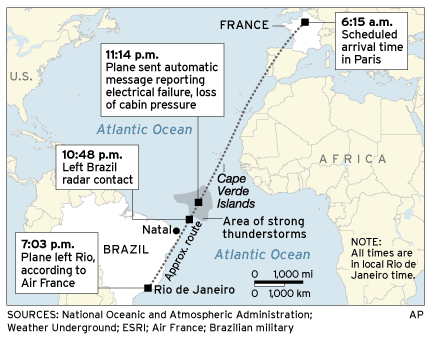
- What Happened to Flight 447?
June 1, 2009
http://www.reuters.com/article/2009/06/02/us-airline-crash
- A succession of a dozen technical messages showed that several electrical systems had broken down, most ominously the pressurization system - a totally unprecedented situation in the plane. A succession of a dozen technical messages (showed that) several electrical systems had broken down.
- What Really Happened Aboard Air France 447
December 6, 2011
http://www.popularmechanics.com/technology/aviation/crashes/
- At 1h51m, the cockpit becomes illuminated by a strange electrical phenomenon. The two copilots discuss the unusually elevated external temperature, which has prevented them from climbing to their desired altitude. Suddenly, a strange aroma, like an electrical transformer, floods the cockpit, and the temperature suddenly increases. Just then an alarm sounds for 2.2 seconds, indicating that the autopilot is disconnecting. Note, however, that the plane has suffered no mechanical malfunction. The word "Stall!" will blare through the cockpit 75 times.
The Germanwings crash cannot blame the weather, which was perfect. Per the Zetas, the airline industries will not allow the truth to be told. Profits come first, and the lives of the common man are the least of their concerns.
ZetaTalk Comment 3/28/2015: The public will never learn the truth, as in all such cases electromagnetic interference is dismissed, the profits and jobs involved in the airline industry taking precedence of the truth. This will result in any case as the public gets leery of air travel, insurance costs rise, and airline companies go out of business.
Source: ZetaTalk Newsletter Issue 445
Small Planes Crashing
During a 5 day period from June 8-13, 2016 the portion of the N American continent most affected by the bow stress was afflicted by numerous small plane crashes. The bowing of the N American continent pulls the Aleutian Islands toward the tip of Mexico, with the center of the bow near San Diego. Thus, in a swath across the center of the US, small planes were suddenly crashing, with no warning, with no communications from the cockpit in most cases, a clear sign they were afflicted by Electro-Magnetic-Pulse. This onslaught showed up on the Global Incident Map for aviation.
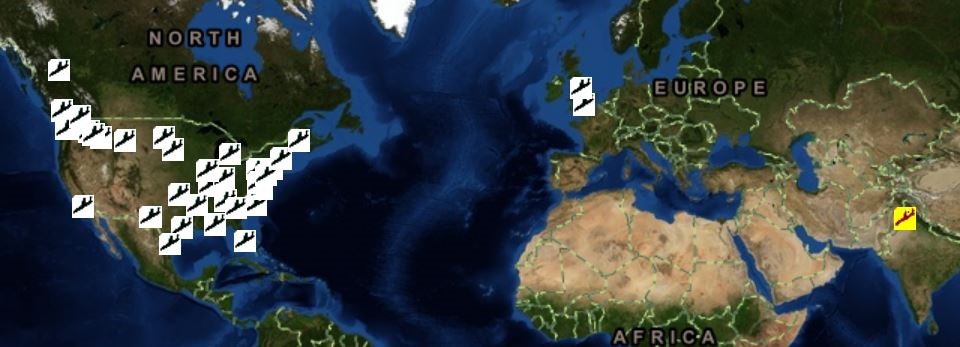
One of the most publicized incidents was the spinning crash of a small plane in Houston on June 9. The pilot reportedly made repeated attempts to land the plane, aborting each time due to his lack of control over the planet. It appears the pilot had also lost communications. Then in a final fatal spin, the plane crashed, killing all on board. The plane had flown from Oklahoma to Houston, crashing at its destination.

- Plane Spins, Drops from the Sky
June11, 2016
http://www.cnn.com/videos/us/2016/06/11/plane-drops-from-the-sky
- The NTSB is investigating the cause of a single-engine plane crash that killed three people in Houston.
- NTSB: Pilot Tried to Land 3 times before Houston Plane Crash
June 10, 2016
http://www.cbsnews.com/news/ntsb-pilot-tried-to-land-for-3rd-time
- The pilot of a plane that crashed near a Houston airport halted a third attempt to land just before it plummeted to the ground, killing all three inside. It's unclear whether the pilot made a distress call just before the crash that happened. The plane was in a flat spin before it plummeted to the ground nose-first.
Not a day later near Hawthorne, California, a small plan dove into an apartment complex. No distress signal had been relayed, no communications whatsoever. Unless the pilot had a heart attack, the clear answer is yet another incident of Electro-Magnetic-Pulse disabling the electronics on the plane.
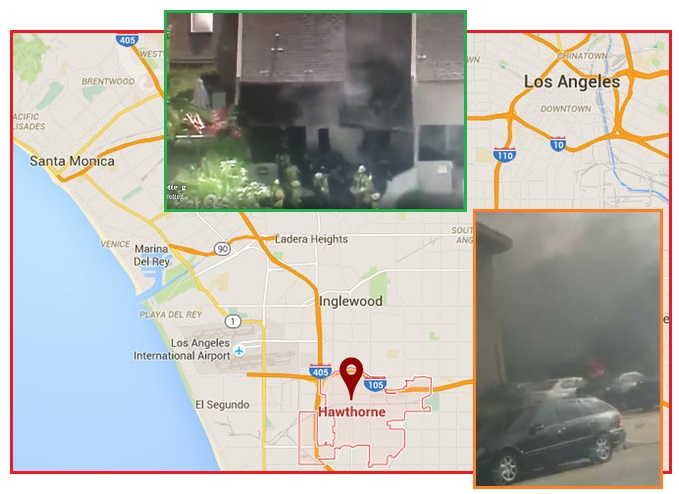
- Cessna Plane Crashes into Apartments in Hawthorne, California; 2 Dead
June 11, 2016
https://www.rt.com/usa/346182-cessna-plane-crash-hawthorne/
- A small plane slammed into a two-story townhouse in Hawthorne, in the south west of Los Angeles County. Hawthorne Municipal Airport is less than two miles from the crash site. The Federal Aviation Administration and the National Transportation Safety Board will investigate the crash.
- 2 Dead After Plane Crashes Into Townhouse Complex Near Hawthorne Airport
June 11, 2016
http://ktla.com/2016/06/10/light-plane-crashes-into-residential-bui...
- The plane went down around 5:12 p.m. in the 4600 block of W. Broadway killing two people on board. The aircraft slammed into two townhouses in the complex. The aircraft, described as a Grumman American AA-1B, crashed two miles west of the airport under unknown circumstances.
Other incidents include a crash near Batesville, Indiana on June 8 which was blamed on an unexplained “mechanical problem”. Investigation ongoing. Another on June 10 crashed into May Lake near Bismark, N Dakota which is being blamed on the youth of the pilot. Investigation here also ongoing. Then on June 11 the pace picked up with a crash in Santa Rosa, California where the plane ended upside down in a field. The aircraft had reportedly been making “odd sounds” and the pilot, who survived, was having problems with the throttle. Another near Collegedale, Tennessee during a failed landing. Apparently, there were no communications and no survivors.
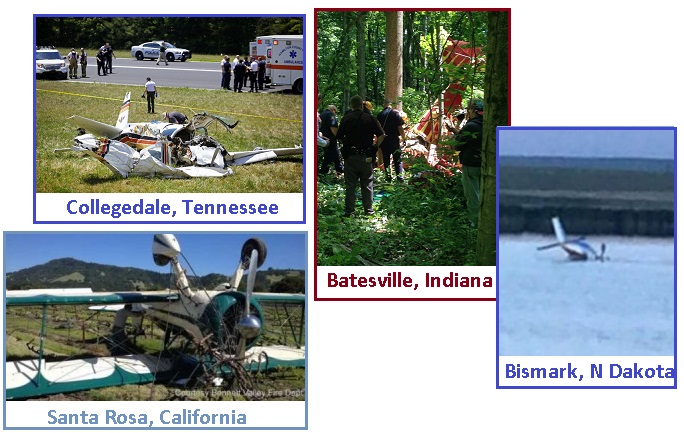
- Pilot Airlifted to Hospital after Small Plane Crashes near Batesville Airport
June 8, 2016
http://fox59.com/2016/06/08/pilot-airlifted-to-hospital-after-small...
- The crash occurred near Three Mile Road and Enochsburg Road around 11:45 am. An initial investigation determined that the plane was a homemade ultralight single person aircraft. The pilot took off from the airport and soon experienced a mechanical problem. The aircraft then went down in a heavily wooded area not far from the airport. The investigation into the crash is ongoing.
- Small Plane with Young Pilot Crashes, Killing all Onboard
June 10, 2016
http://www.cbsnews.com/news/north-dakota-airplane-crash-lake-dead-p...
- The four-seat plane crashed into May Lake near the town of Wishek while en route to Bismarck. Complications during takeoff from Wishek's airport resulted in the crash. The Federal Aviation Administration is investigating.
- Pilot Uninjured after Small Plane Crash in Santa Rosa
June 11, 2016
http://arffwg.org/pilot-uninjured-after-small-plane-crash-in-santa-...
- Personnel from the Bennett Valley Fire Department could hear a plane flying low in the area making an odd sound around 10 a.m. A short time later, the department received a report of a small plane crash in a vineyard near 6500 Jamison Road. Emergency responders arrived on the scene to find the biplane aircraft upside down in the vineyard. The pilot had been flying in the area when he realized there was a problem with the plane’s throttle, causing the aircraft to idle.
- Official says 2 People Dead in Plane Crash in Tennessee
June 11, 2016
http://www.foxnews.com/us/2016/06/11/official-says-2-people-dead-in...
- A single-engine plane crashed around 12:50 p.m. at the Collegedale airport. The plane was coming into the Collegedale airport when it crashed. She said she did not if anyone else outside the plane was injured or if there was property damaged in the crash. Collegedale is a city about 20 miles east of Chattanooga.
What’s causing this increase in Electro-Magnetic-Pulse (EMP) on the N American continent? The N American continent is a flat top, unable to roll, and thus as the Atlantic expands and the Pacific shortens, Mexico pulled to the west, there is unrelieved diagonal stress on the N American continent. This is resolved when the New Madrid rips open, but until this occurs the rock is screaming. Compression in the rock squeezes air out of pockets in the rock, allowing electricity to rise unimpeded through the rock layers and arc to the charged tail of Nibiru. Booms are back with a fury in 2016, and dramatic blackouts occurred along the East Coast in 2015 as did a derailed Amtrak train in Philly.

ZetaTalk Prediction 2/10/2006: The giant plates of N America and Eurasia are locked against each other, unable to rotate against each other due to their shape. But the primary drama preceding the pole shift will be the ripping action that a plate unable to move must endure.
ZetaTalk Prediction 1/10/2015: We have consistently warned that electro-magnetic pulse, the arcing from the electronic screech in compressed rock to the charged tail of Planet X, will be on the increase. This brings down the grid, as surge and brownout destroy electronic infrastructure and electronic grids are designed to protect themselves thus. Blackouts, electronically damaged airplanes, and interference with mankind’s satellites will be on the increase.
ZetaTalk Prediction 5/28/2016: We have stressed that airplane travel will get increasingly risky, due to EMP which is already taking planes down in dramatic fashion.
Source: ZetaTalk Newsletter Issue 508














:max_bytes(150000):strip_icc():focal(742x456:744x458):format(webp)/atc-tower-022326-1afe0757982a40b88ca404e8c0212ff2.jpg)


You need to be a member of Earth Changes and the Pole Shift to add comments!
Join Earth Changes and the Pole Shift